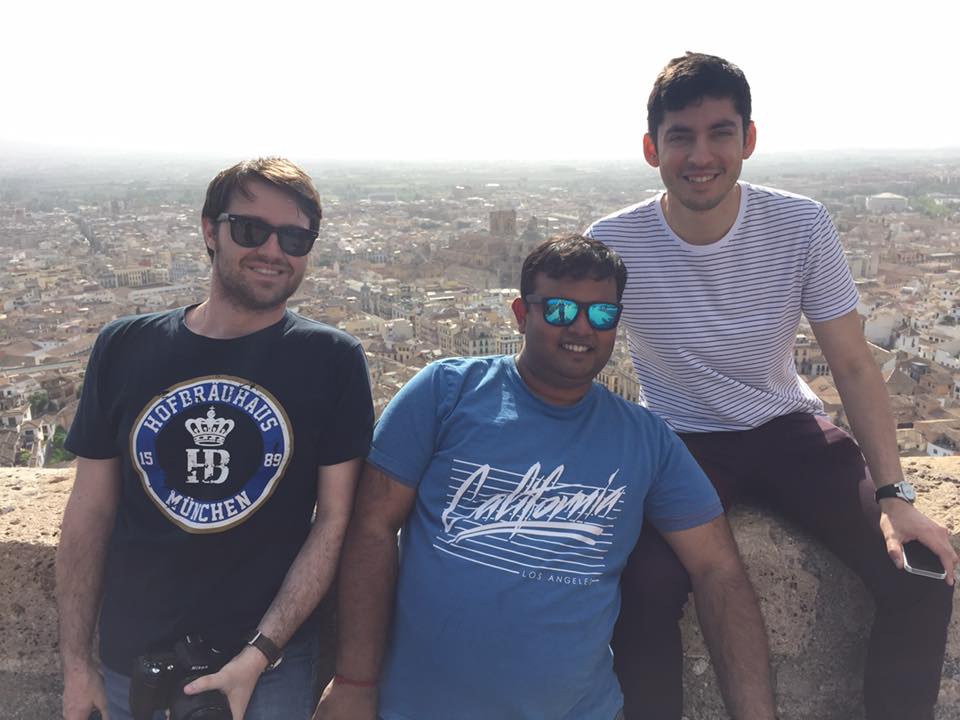Effective cross-cultural management: my week in Granada
23/06/2017

Our first day of our cross-cultural management module started with a language and cultural course. We got to understand what the Spanish culture was all about and the traditions they have like the fiestas and the tomato festival. It was interesting and exciting and bought another dimension to the Spanish culture, particularly for myself, coming from an Asian background.
Seeing the Europeans going about their own traditions and culture was very insightful. I thought this particular class was very interesting in the sense that the teacher actually took the time to explain what each festival was all about and the meanings behind them. Sometimes we celebrate festivals without knowing the meaning behind them so that actually helped us appreciate the culture even more.
The module kicked off discussions about effective cross cultural management in today’s world. We need to think about what culture is all about and what ideas are connected with it.
On the second day, Professor Michael Dickmann began teaching our Effective Cross Cultural Management module. To introduce the module he allowed us to present our different countries. I delivered a talk about Singapore based on three key areas. One of the areas was about what foreign nationals don’t understand about your culture. That allowed me to tell my classmates what expats don’t get about my country. They learnt something new. It was a great opportunity to exchange ideas and we learnt a lot from each other about our home countries (Singapore, Italy, Chile, Britain, and Nigeria).
This mix actually allowed us to understand each other’s cultures and learn more about them. It was quite fascinating for me because sometimes there is a level of ignorance towards finding out what other people’s cultures are all about. This module actually helped me to understand the issues that different cultures are facing.
In the afternoon, we went to Alhambra, the UNESCO World Heritage Site. I have never been to a UNESCO World Heritage Site as beautifully built as this one. I have been to several UNESCO World Heritage Sites but seeing a very Muslim kind of building in Spain was quite remarkable. The visit allowed me to understand how this Muslim influence came into Spain.
The trip has certainly strengthened my relationships with my classmates, particularly because we were able to exchange ideas, learn more about each other’s cultures and to identify the connections between our cultures. We had to complete a group task which was about national culture and the Hofstede and Trompenaars framework of cultural dimensions.
From my own experience, it has definitely enhanced my understanding. You need to appreciate other people’s cultures when you go out into the working world and to work in different environments in the future.
We are always moving around from one place to another so we must be able to change ourselves to suit the environment that we are in and we should actually be open to change and also able to accept cultural differences. You cannot exist within your own four walls so I think this module has certainly prepared me for the kind of environment where I need to be able to understand other people’s cultures and to celebrate the differences. This is very important because if you’re not able to celebrate the differences and also go along with them, it will create a lot of conflict in the future.
I see myself working in different countries in the future so that’s why I picked this module. I think it’s very important for me to develop professionally and to have this cultural intelligence so this module has certainly provided me with the cultural awareness and knowledge that I’ll need to work successfully in the future.
Categories & Tags:
Leave a comment on this post:
You might also like…
Keren Tuv: My Cranfield experience studying Renewable Energy
Hello, my name is Keren, I am from London, UK, and I am studying Renewable Energy MSc. My journey to discovering Cranfield University began when I first decided to return to academia to pursue ...
3D Metal Manufacturing in space: A look into the future
David Rico Sierra, Research Fellow in Additive Manufacturing, was recently involved in an exciting project to manufacture parts using 3D printers in space. Here he reflects on his time working with Airbus in Toulouse… ...
A Legacy of Courage: From India to Britain, Three Generations Find Their Home
My story begins with my grandfather, who plucked up the courage to travel aboard at the age of 22 and start a new life in the UK. I don’t think he would have thought that ...
Cranfield to JLR: mastering mechatronics for a dream career
My name is Jerin Tom, and in 2023 I graduated from Cranfield with an MSc in Automotive Mechatronics. Originally from India, I've always been fascinated by the world of automobiles. Why Cranfield and the ...
Bringing the vision of advanced air mobility closer to reality
Experts at Cranfield University led by Professor Antonios Tsourdos, Head of the Autonomous and Cyber-Physical Systems Centre, are part of the Air Mobility Ecosystem Consortium (AMEC), which aims to demonstrate the commercial and operational ...
Using grey literature in your research: A short guide
As you research and write your thesis, you might come across, or be looking for, ‘grey literature’. This is quite simply material that is either unpublished, or published but not in a commercial form. Types ...






